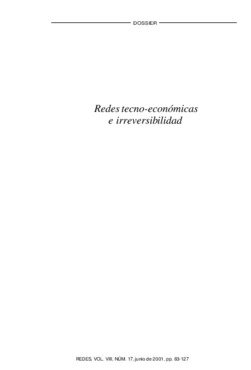Redes tecno-económicas e irreversibilidad
Techno-economical networks and non-reversibility

Ver/
Fecha
2001-06Autor
Callon, MichelResumen
En el presente texto Michel Callon propone un análisis de la ciencia y la tecnología a partir de la noción de Red Tecno-económica, entendida como un conjunto coordinado de actores heterogéneos (que incluye humanos y no-humanos). A partir de este concepto, en la primera parte del artículo se desarrollan las nociones de intermediario, actor y traducción, consideradas como herramientas de análisis apropiadas para comprender y describir los mecanismos por los cuales se ponen en relación actividades heterogéneas. En la segunda parte se muestra cómo se establecen y evolucionan las redes: las dos nociones centrales aquí son la de convergencia y la de irreversibilización, fundamentales para dar cuenta de la construcción y la evolución de las relaciones entre elementos en principio inconmensurables. En una tercera parte se analiza la dinámica de las RTE, poniendo en evidencia la diversidad de trayectorias posibles. A su vez se presentan las herramientas (cualitativas y cuantitativas) utilizadas para describir y analizar las redes. This paper presents an analysis of the behavior of science and technology from the standpoint of the concept of techno-economical network, understood as acoordinated set of heterogeneous factors (including both human and non-human actors). In the first part of the paper are developed the concepts of mediator, actor and translation as analysis tools suited to both understand and describe the mechanics by means of which diverse activities become related. In the second part of the article the way in which networks are established and evolve are shown: the two core notions here are convergence and non reversibility, both notions are basic in order to render an account of the building and evolution of the relations between elements, which in principle are non-measurable. In yet a third part the dynamics of the techno-economical networks is analyzed, evidencing the diversity of possible courses. Additionally, both qualitative and quantitave tools used to describe and analyze networks are described.
